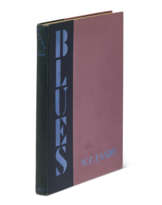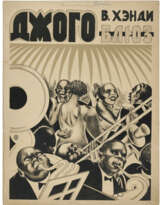ID 1029100
Lot 449 | Father of the Blues and Unsung Americans Sung
Valeur estimée
£ 1 500 – 2 500
First editions, signed and inscribed by W. C. Handy. Father of the Blues inscribed in black ink on the front free endpaper to radio broadcaster Kathryn Cravens ‘In memory of our broadcast and your first wonderful interview of the writer. W. C. Handy. 9-19-1941'; and Unsung Americans Unsung similarly inscribed to notable African-American journalist George S. Schuyler ‘With sincere appreciation, W.C. Handy, 9-2-1944'.
According to jazz historian Frank Tirro, W.C. Handy was the ‘man largely responsible for the spread and popularity of the blues as we know it today’. The child of ex-slaves ‘who disapproved strongly of secular music’, Handy became a cornetist, composer and orchestra leader who ‘paved the way for public acceptance of the...folk blues, as distinct from spirituals and worksongs’. Father of the Blues ‘tells the story of a musical career that has affected as many lives as that of Bach, Brahms or Wagner…’, said the New York Times review. ‘His story is musical history and American history through and through.’ Unsung Americans Sung celebrated the lives of notable African Americans through folk tales and folk songs. As Handy writes in his foreword, ‘This book, in brief, is a rainbow of Song and Story in the Forgotten Lives of Yesterday’s Children.’ New Grove, 8:144. Tirro, 133.
2 volumes, octavo. Father of the Blues with original blue cloth, original dust-jacket, Kathryn Cravens’ bookplate to front pastedown. Unsung Americans Sung with original paper boards, original dust-jacket.
[With:] – a typed letter signed ‘W. C. Handy’ to Mrs. Blanche Denton, 1650 Broadway, New York, 6 July 1948. Handy speaks movingly of old age ‘It is sad to think that we are all paying the debt which we must pay sooner or later… I will be seventy-five on the 16th of November and blind, but I am able to sign my checks and dictate my compositions and am surrounded by four children and a brother and five grand-children,’ fondly remembers Denton’s late husband, who came to his defence during an ugly business altercation ‘I remember a certain gentleman at Marks coming to the train to kill me because he had cancelled an engagement that I held three months and I wrote him that caused me to lose money and I thought he should pay some of the bill, and… he [Mr. Denton] said to the gentleman, “that is nothing to kill him for, you ought to pay him,”’ entreats her to provide the contact details of old friends ‘I hope when you have read this letter… and my autobiography, “Father of the Blues” which I am sending you, you will get someone to write down some of the names and addresses of some of those Delta friends,’ describes the books he has written and edited, including Blues: An Anthology ‘that is where you will get the real story of the Blues and its influence on modern composers,’ and acknowledges several formative experiences in the Mississippi Delta, which influenced the development of his musical style ‘it is true that I got the idea of writing “Yellow Dog Blues” at Tutwiler listening to a guitarist singing “He’s Gone Where The Southern ‘Cross the Dog”….’
Three pages, Handy Brother’s Music Co., Inc. letterhead, 280 x 216 mm.
| Adresse de l'enchère |
CHRISTIE'S 8 King Street, St. James's SW1Y 6QT London Royaume-Uni | ||||||||
|---|---|---|---|---|---|---|---|---|---|
| Aperçu |
| ||||||||
| Téléphone | +44 (0)20 7839 9060 | ||||||||
| Commission | see on Website | ||||||||
| Conditions d'utilisation | Conditions d'utilisation |








